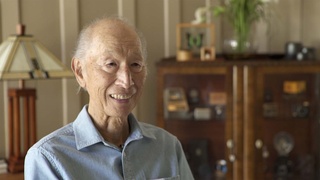Interviews
Father as prisoner of war in hospital
My mother made calls to see if she could visit her husband, and then she started visiting him each day. And since he was getting weaker and weaker, she asked the authorities if he could be taken to a hospital, and when he feels better, put him back into prison. And so, they did. But, the hospital was the only hospital there, San Pedro Hospital—all the injured merchant marines on Wake Island were being sent there, and they were all in one big room, and they were all injured, you know. And my father was in the same room and only around his bed there was a sheet, and it said, Prisoner of War. And so, when my mother went to visit him and saw that, she felt that he would be beaten up by all the, other, the Americans who were there as injured Americans. And so then, she kept begging the hospital to give him a room of his own—that he would never make it out alive in that big room with the Americans.
And then, we kids got to see my father once, it was January 13th. My twin brother came back, he was going to Berkeley, and he immediately, it seems so strange, he immediately got into the Army. And, gee, we thought, gee, that’s strange that here my father, they don't, you know, they think he's a spy and they have him in prison, and my brother they take him into the U.S. Army. Well, he was so proud when he got his uniform, that the day we visited my father was January 13th. When my father saw my brother in a uniform, he starts shaking. He thought it was someone else coming again to interrogate him. And, my brother said, Oh, I'm your son. You know, and my father never believed it. And so, when we could see how frightened he was, we said, Look, let’s just leave, 'cause pop just looks too scared.
Date: June 16, 2003
Location: California, US
Interviewer: Karen Ishizuka, Akira Boch
Contributed by: Watase Media Arts Center, Japanese American National Museum.





